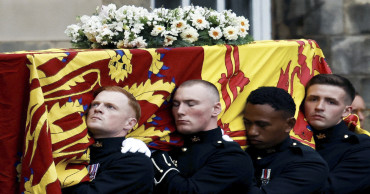Houses of Parliament
Rules issued for paying respects to the queen
People wanting to pay their final respects to Queen Elizabeth II as she lies in state at the Houses of Parliament in London need to be prepared for a long wait.
The government has published guidelines for people wishing to file past the late queen's closed coffin as it lies in state at the Palace of Westminster from 5 p.m. (1600 GMT) Wednesday until 6:30 a.m. (0530 GMT) on Sept. 19. Thousands are expected to want to pay tribute to the only monarch that many in the United Kingdom have ever known.
The rules were made public a day after thousands of people lined roads and bridges Sunday as a hearse carried the queen's coffin across the Scottish countryside from her beloved Balmoral Castle to Edinburgh.
Read: Queen’s coffin leaves Scottish estate for last journey back to London
“If you wish to attend the Lying-in-State, please note that there will be a queue, which is expected to be very long. You will need to stand for many hours, possibly overnight, with very little opportunity to sit down as the queue will be continuously moving,” the Department for Digital, Culture, Media and Sport said in its guidelines.
The closed coffin of the monarch who died Thursday at 96 will rest on a raised platform called a catafalque in Westminster Hall at the Houses of Parliament.
“Large crowds are expected, and there are likely to be delays on public transport and road closures around the area,” the ministry warned.
Visitors will have to pass through airport-style security and can only bring one small bag with one zipper opening. Larger bags can be stowed at a special facility — but only if there is space available.
The ministry advises people to bring essentials for a potentially long wait exposed to whatever elements an early fall day in London can throw at them — an umbrella or sunscreen, a cell phone power bank and any needed medication.
No food or liquids will be allowed past security screening at the Houses of Parliament. Nor will flowers or other tributes such as candles, toys or photographs.
“Please respect the dignity of this event and behave appropriately. You should remain silent while inside the Palace of Westminster,” the advice says, adding that people must dress appropriately and turn off their mobile phones before going through security.
Read: Stepping up: More scrutiny for next generation of royals
Included in a list of things not to do: “Film, photograph, use mobile phones or other handheld devices in the security search area or within the Palace of Westminster. Bring or erect gazebos or tents. Light barbecues and fires.”
And a long list of prohibited items includes fireworks, smoke canisters, flares, whistles, laser devices and other items that could be used to cause a disturbance as well as any banners, placards, flags, advertising or marketing messages.
3 years ago
Voting underway to elect new India President
Voting is underway in India to elect a new President, in a high-octane contest where over 4,500 lawmakers across the country are eligible to exercise their franchise.
The front-runner is ruling Bharatiya Janata Party's candidate Droupadi Murmu, a tribal politician and a former state governor. She is being challenged by opposition candidate Yashwant Sinha, a former Finance Minister.
In India, the President is elected not directly by the people but by the members of both Houses of Parliament -- the Rajya Sabha and the Lok Sabha -- and state assemblies and federal government-ruled Territories.
Like in Bangladesh, the Indian President is the ceremonial head of state who does not exercise executive powers.
Read: Bengal governor likely to become India's Vice-President
The counting of votes will be held on July 21 and India's 15th President will take oath of office on July 25, replacing incumbent head of state Ram Nath Kovind, according to the Election Commission of India.
Murmu, a former teacher hailing from the eastern state of Odisha, is projected to win as President, with Prime Minister Narendra Modi's ruling party and its coalition partners commanding over 48% of the electoral vote.
If elected, the 64-year-old will be youngest and first tribal President of India.
Who's Murmu?
Born in independent India on June 20 in 1958, Murmu completed her graduation in 1979 and began her career as a government employee before becoming a school teacher.
She subsequently made a foray into the eastern Indian state of Odisha's politics, first as a local civic body councillor and then as a legislator.
The two-term legislator went on to become a minister in the state government in 2000. And some 15 years later, Murmu was sworn in as the first woman Governor of the eastern state of Jharkhand.
In her personal life, Murmu lost her husband and their two sons. While her husband died of a cardiac arrest, one of her two sons was found dead under mysterious circumstances in 2009. She has a daughter.
3 years ago


